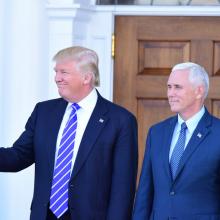Nikki Haley
"It became apparent that in some areas, the accusations of sexual aggression were being taken seriously and people were being held accountable ― except for our president,” Leeds said. “We’re at the position now where in some areas of our society, people are being held accountable for unwanted behavior, but we are not holding our president accountable for what he is and who he is."
Pope Francis urged the United Nations on March 28 to seek the "total elimination" of nuclear weapons, speaking as the United States and some other major powers boycotted a conference considering a global ban.
In a message to the conference that started in New York on March 27, Francis called on nations to "go beyond nuclear deterrence" and have the courage to overcome the "fear and isolationism" he said was prevalent in many countries today.
Republican South Carolina Gov. Nikki Haley will be a rare woman on Donald Trump’s Cabinet-level team, and one of the few persons of color.
Knowing little about her foreign policy positions, given that she has little to no international experience, what should we expect from Haley once she is confirmed to be ambassador to the United Nations?
President-elect Donald Trump will spend much of the time until his inauguration on Jan. 20 composing his new administration. That means naming Cabinet appointees, and government department or agency heads, as well as selecting advisers.
Many of Trump’s appointments so far are people of faith; some are supported or opposed by different faith groups; others have made public statements, or taken actions, regarding different faith groups.
Here is a list of Trump’s picks to date and a description of their relationship to religion.
When the Confederate flag was removed from the South Carolina statehouse Friday morning, Gov. Nikki Haley spoke solemnly of the nine black churchgoers who were shot to death less than a month ago at Charleston’s Emanuel African Methodist Episcopal Church.
“We have all been struck by what was a tragedy we didn't think we would ever encounter,” Haley said of the horrifying massacre before she signed the bill with nine pens that will go to the families of the victims. “Nine amazing people that forever changed South Carolina's history."
Haley also referenced the “grace” shown by the nine families when they forgave the white gunman. She said their grace helped usher the state toward this long overdue decision. The assassinations at Emanuel AME, followed by forgiveness from the grieving families, were similarly cited by several South Carolina lawmakers as their reason for voting to remove the flag. Black Deaths Matter. That’s the painful and dangerous narrative being developed out of South Carolina. Only Black Deaths Matter. Our nation is capable of doing the right thing – such as taking down the Confederate flag in the year 2015, a flag that represents the racist, immoral, unconstitutional defense of slavery and Jim Crow – but only when black deaths happen and are met by a response deemed acceptable. Ever since this flag was raised in 1961 to send the message that South Carolina would not honor equal protection under the law, tens of thousands of small and large protests have not been enough to move the power brokers to take it down.
Nikki Haley, the governor of my state, recently signed the South Carolina Illegal Immigration and Reform Act. The law, which is part of a recent wave of state immigration legislation, goes into effect in January. As she signed the bill, she stated:
“What I’m concerned about is the money we’re losing because of illegal immigration in this state. The money that’s lost in education and medical services and workers and employment and all of those things is well beyond millions of dollars …”
It is dehumanizing when you refer to people only in terms of money. Further, the research does not support the governor’s statement.
According to the Institute for Taxation and Economic Policy, undocumented workers in South Carolina paid $43.6 million in state and local taxes in 2010. Another study outlined the losses to the state if all unauthorized immigrants were removed from South Carolina. The state would lose $1.8 billion in economic activity, $782.9 million in gross state product and approximately 12,059 jobs.





